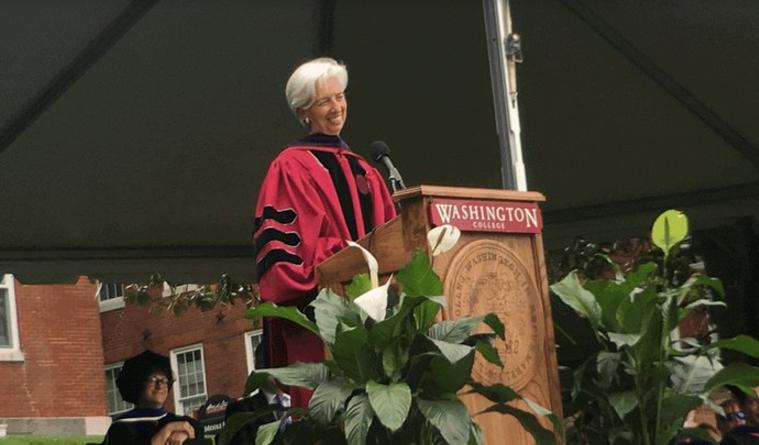Christine Lagarde, managing director of the International Monetary Fund, encouraged graduating Washington College students to keep an open mind to the constant question of “what comes next,” while knowing that their education has given them the strongest footing from which to answer it throughout their lives.

Christine Lagarde, managing director of the International Monetary Fund, addresses the Class of 2017 at Washington College, May 20
“Saying ‘I don’t know’ is one of the hardest things to do in life,” Lagarde told graduates, families, faculty, and alumni during the college’s 234th Commencement on the Campus Green, May 20. “We have all been trained from a young age to have an answer at the ready. But the reality is that the answer is not what matters most—it is knowing how to find the answer that is key. Your education—this wonderful, complex, classical, liberal arts training—has given you the foundation you need to begin to solve the puzzle of ‘What comes next?’ ’’
Although the future these graduates face is one where technology, automation, and artificial intelligence may take over the tasks now managed by humans, Lagarde said that the problem-solving skills, empathy, and perspective inherent in the liberal arts will become even more critical as time goes on.
“Many of the founders of this country, who were lawyers, businessmen, and farmers by training, could also recite orations from Pericles by heart. Those polymath skills not only gave their revolution historical context, it informed the society they hoped to build,” she said. “Your school embodies their vision and has instilled in you a love of knowledge. Success for your generation requires a commitment to life-long learning and an understanding that today is a milestone in your education, but it is not the end. The truth is that college has taught you how to learn, not what to learn.”
“By choosing Washington College, each of you has stood up and said that public service is important in your life. The values of this institution come directly from Washington himself; his example serves as the inspiration for your honor code. You have made a promise to help others and now you must follow through,” she said. “Think about what matters most to you—is it climate change? Homelessness? Improving education? Whatever it is, fight for it.”
Read the complete text of LaGarde’s speech here.
Before the address, President Sheila Bair awarded Lagarde an honorary doctor of laws.
Along with conferring degrees upon 292 graduates, the ceremonies on the campus green included multiple awards and citations:
- James Allen Hall, associate professor of English and the director of the Rose O’ Neill Literary House, earned the Alumni Association’s Award for Distinguished Teaching.
- Alex Aiello Roberts, a math and computer science major, philosophy minor, from Bel Air, Md., won the George Washington Medal and Award, given to the senior who shows the greatest promise of understanding and realizing in life and work the ideals of a liberal education.
- Anna Elizabeth Inserra, a chemistry major from Dix Hills, N.Y., won the Clark-Porter Medal, given to the student whose character and personal integrity, in the opinion of the faculty, have most clearly enhanced the quality of campus life.
- Alexandra D. Kurtz, of Lancaster, Pa., a political science major with minors in economics and Spanish, won the Louis L. Goldstein ’35 Award, for a graduating senior who, in the opinion of the faculty, has demonstrated unusual interest, enthusiasm, and potential in the field of public affairs.
- Erika Louise Koontz, of Woodbine, Md., an environmental studies major with minors in Spanish and biology and a concentration in Chesapeake regional studies, earned the Eugene B. Casey Medal, given to a senior woman voted by the faculty to be outstanding in the qualities of scholarship, character, leadership, and campus citizenship.
- Patrick S. Ginther, of Harleysville, Pa., a double major in chemistry and biology with concentrations in biochemistry and organic and medicinal chemistry, won the Henry W.C. Catlin 1894 Medal, given to a senior man voted by the faculty to be outstanding in the qualities of scholarship, character, leadership, and campus citizenship.
- Two students won this year’s Jane Huston Goodfellow Memorial Prize, which goes to the graduating senior majoring in science who has an abiding appreciation of the arts and humanities and has shown scholastic excellence. They are Laura Elizabeth King, of Rising Sun, Md., a double major in biology and Hispanic studies, and Ryan Manning, of Chestertown, an English and chemistry double major and creative writing minor.
- The Gold Pentagon Awards go to one senior and one alumnus, faculty, or friend of the College, selected by the Omicron Delta Kappa Society, in recognition of meritorious service to Washington College. This year they are Madeleine Morrissette, of Arlington, Mass., a biology major with a minor French studies, and Edward P. Nordberg ’82, former chair of the Board of Visitors and Governors.
- Catalina Righter, an English major and creative writing minor from Manchester, Md., won the Sophie Kerr Prize, given to the senior who shows the most promise for future literary endeavor.



Write a Letter to the Editor on this Article
We encourage readers to offer their point of view on this article by submitting the following form. Editing is sometimes necessary and is done at the discretion of the editorial staff.